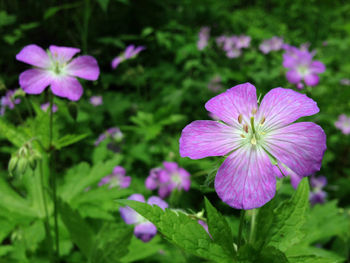Wild Geranium
Other Names : Geranium maculatum, Alum root, Alum, spotted geranium, or wood geranium
The roots can be harvested in the autumn then dried and stored. It is best to harvest the roots as the plant comes into flower since it is then at its most active medicinally. The leaves are harvested as the plant comes into flower and are dried for later use.
Special Precautions of Wild Geranium
- Avoid use during Pregnancy and breast feeding
- The roots contain high amounts of tannins.
- Contains calcium oxalate
- Use not more than 20-25g at ounce. An excess can cause kidney damage.
Health Benefits and Uses of Wild Geranium
Some of the constituents in Alum Root include tannic, citric and gallic acid, starch, sugar, gum, oleoresin, pectin, anthocyanins and calcium oxalate. The plants are rich in tannin, the root containing 10 - 20%. An infusion of the whole plant, or of the roots alone, is used in the treatment of diarrhoea (especially in children and the elderly), dysentery, irritable bowel syndrome, cholera, kidney complaints, bleeding and a wide range of other ailments.
- Wild Geranium is considered an astringent, a substance that causes contraction of the tissues and stops bleeding.
- The Mesquakie Indians brewed a root tea for toothache and for painful nerves and mashed the roots for treating hemorrhoids
- Like many other tannin-containing substances, Native Americans also used Wild Geranium as an anti-diarrhea treatment. A plant- infused tea was made to achieve this purpose, though some sources say the tea could have had the opposite effect, causing constipation.
- When ingested, Alum Root is an old and reliable treatment for internal piles and hemorrhoids.
- Taken internally, Alum Root has a potent healing effect on the entire gastrointestinal tract and has been used as an excellent treatment against pus and mucus in the bladder and intestines or, in fact, mucous discharges from any part of the body.
- It is helpful in reducing inflammation of the mucous membranes, curbs irritation of hemorrhoid tissue and promotes venous health.
- Used externally, it is a powerful blood coagulant: The dry powder sprinkled on a wound or cut will stop bleeding immediately. (Barbers have used it as a styptic for years to stop razor cuts.)
- it is applied to purulent wounds, haemorrhoids, thrush, vaginal discharges and inflammations of the mouth.
- As a mouthwash, Alum Root will aid in the relief of mouth sores, sore throat, and bleeding gums.
- Alum Root has been used to treat ulcers and has been found helpful in fighting the bacteria in tuberculosis.
